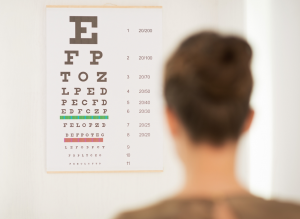
According to a 2010 survey by Mintel, 1 in 5 adults admit to either rarely having an eye test or never having one at all. For many people an eye test can be a distraction; if you don’t think you need glasses then why bother going to see an optician? However, this doesn’t tell the full story and an eye test can reveal much more about your health than just your eyesight.
An eye test can detect a range of poor health conditions including diabetes
Far from simply assessing your need for glasses, an eye test can detect conditions such as diabetes. Around three quarters of a million people in the UK are currently suffering from diabetes and do not even know it and the condition can prove to be life threatening if it is not treated with proper medication and a healthy diet.
A simple eye test can detect the signs of diabetes; over time the condition weakens the tiny blood vessels which are close to the retina and this can be picked up by an optician. Most people are very surprised what an eye test can detect.

An eye test can detect high blood pressure
Aside from diabetes, high blood pressure is another major ailment that can be detected through a quick trip to have your eyes tested. Indeed, this actually applies greatly to younger people who haven’t had any blood pressure checks.
While we associated the condition with old age many people in their twenties are starting to develop high blood pressure and it is unlikely that they will get checked for it by their GP. Through an eye test an optician can see the signs of high blood pressure through blood vessels in the retina and in many cases it has saved peoples’ lives.
An eye test can detect glaucoma
Perhaps one of the biggest conditions detected by an eye test is glaucoma. A common problem that can eventual lead to blindness if not treated correctly it can be easily spotted by an eye test check-up even though in its early stages it shows no real symptoms so often goes untreated and unnoticed for years.
An eye test can detect macular degeneration
Lastly we have macular degeneration, a serious condition that an eye test can spot and lead to earlier treatment. The condition generally affects older people and it is categorised by wet and dry types. Although there is no effective treatment for the dry type of macular degeneration an early diagnosis can help you adapt quicker to the problem and the wet type can be treated through laser surgery or medication.

This is not an exhaustive list of conditions and diseases that can be picked up by an eye test but rather it is to highlight some of the more serious medical problems that can be easily identified. Although rare, brain tumours and even cancer can all be seen in their early stages by an optician’s examination and it goes far beyond just inspecting you for new glasses.
How often should you have an eye check?
A good guideline to follow is to have an eye check-up once every 2 years or once per year if you are under 16, over 70 or suffer from diabetes. The process is simple and straightforward and could potentially do much more for you than just prescribing new lenses.
